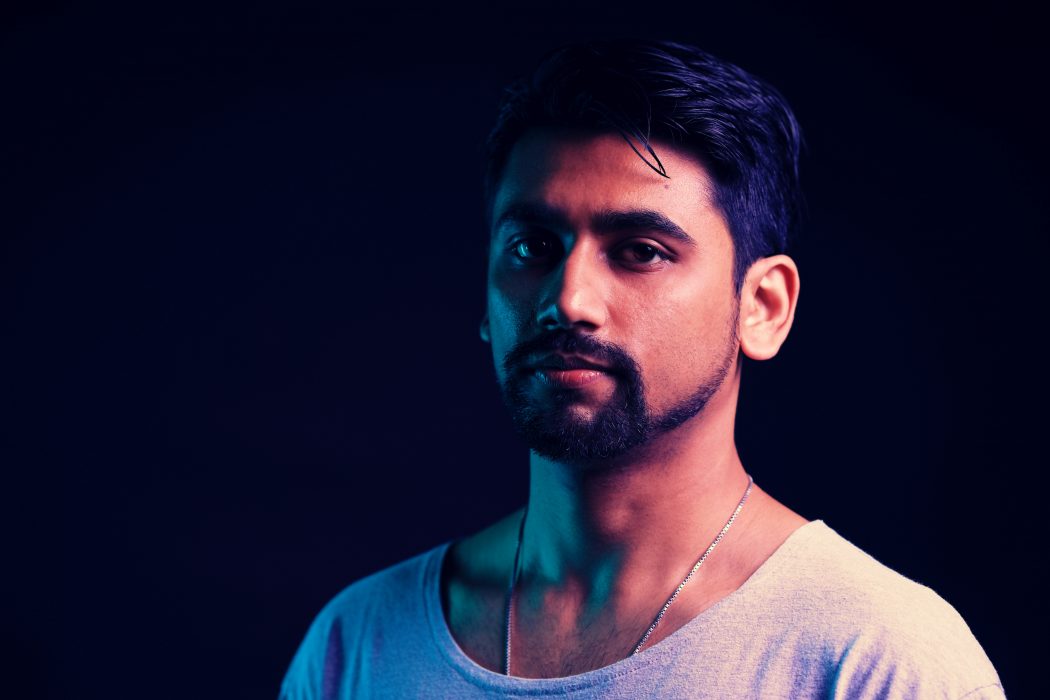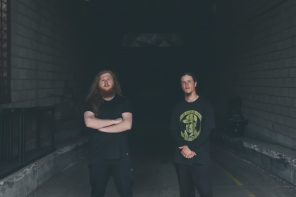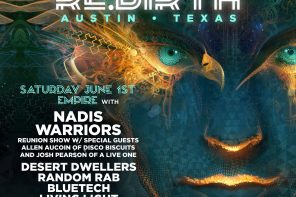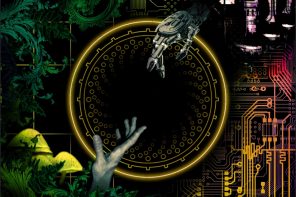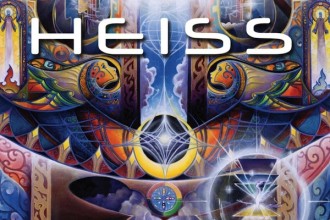KarmasynK is one of the most innovative sound designers of our time who specializes in Drum and Bass soundscapes, and through consistency, has developed a unique approach to creativity. Now living in San Francisco, he attended school at the California Institute of the Arts in Los Angeles as a technical programmer, where he worked on multiple mind stimulating projects focused on interactive design, music production, and film, which ultimately furthered his understanding of design and sound. Raised in India, he initially dove into the psychedelic trance culture enabling him to discover the high energy frequency and mind-altering states that it provides. Having an extensive multi-genre bass background including Glitch Hop, Neuro Hop, IDM and Downtempo – his diverse approach to production has landed him exposure on internationally recognized and respected imprints.
Ruturaj continues to expand his connectivity. Having signed with new international representation, he is making waves with his most recent music releases – Running Savanna on Muti and Stealth Mechanics on Play Me . These two releases offer a glimpse of differentiating drum and bass design – heart expansion and ego shattering. Running Savanna rolls through with a 3 track liquid bass journey emerging in fluidity, where we feel a shift in KarmasynK’s production for the first time. Blending through lighter drum patterns, organic textures, and subtle flute instrumentation, it’s filled with emotive depth. Stealth Mechanics ignites with action based beats which pulsate through eerie sci-fi effects. Synced with intriguing and crescendoing composition, these four tracks are fully dosed in heavy drums and wonky bass keeping high energy. Both EPs bring familiarity to his psychedelic signature roots which reveal a unique and progressive transcendental experience.
Developing lush grooves and accelerating pulsations fused around both emotive and intense gestures, KarmasynK takes you on a deep exploration of the self and outside of it. His music is representative of futuristic design and growth potential that will have you releasing necessary energy in order to welcome a fresh perspective and re-imagine the possibilities of sound. Accompanied with consistent hard work and implementation of balance through yogic focus, he allows this inspirational lifestyle to lead breakthroughs. I reached out to Ruturaj, and through our chat, he told a story and expanded on his design/scoring, musical inspirations, gave advice, and shared techniques.
A Chat with KarmasynK
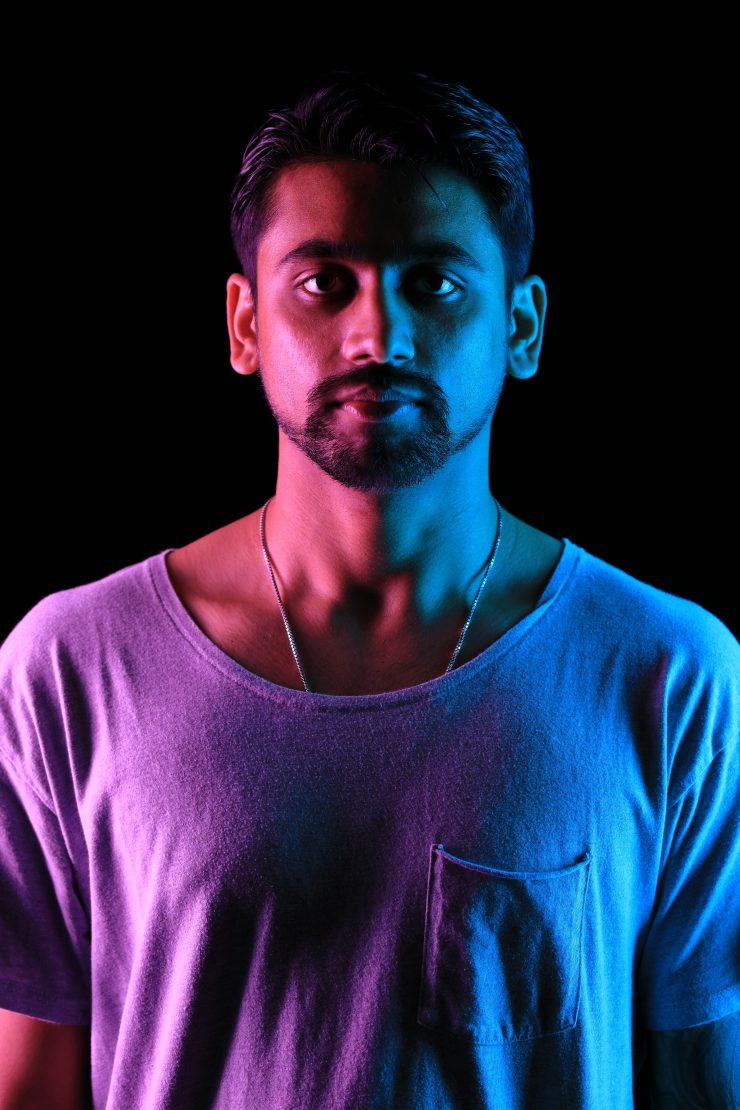
Congratulations on everything happening, you deserve it. Care to share with everyone on some updates in regards to your career as a producer/musician?
Thank you so much! I don’t think it would have been possible without the support of some very awesome people (like yourself). Yes, there is a lot of exciting news – as you know, the past couple of years have been a bit difficult for me. I lost my father to cancer and trying to be creative while coping with the pressure of losing someone so close to you has been challenging. But out of that experience, I’ve learned to be more aware of subtleties of emotions and the way I feel about everything and that has been helpful in my creative process. Amidst all of that, I switched the style of music I produced and had to part ways with Street Ritual agency and completely re-establish myself in a new realm which wasn’t quite accessible for me so easily, so it has taken some work and some time but I’m glad things are starting to look good career wise. I released two EPs this year on the legendary DnB imprint Cause4Concern that have been getting massive support across the DnB community. I also released some beats on Muti Music and Mallabel. I am currently working hard day and night on my full length LP for C4C next year. In order to help me with my DnB touring endeavors, I have signed with Cybergroove Agency who will be handling bookings for me for North America as well as Europe and Asia. I have some more releases scheduled for the rest of this year which you will hear about soon, but now I am just going to have to keep my mouth shut.
Outside of having extensive history with innovative music releases over the years and chances of touring, you’re also a sound designer in other realms. Elaborate on projects you’ve working on while living in Los Angeles and are these extensions something you’d be more interested in, per say design in film and scoring?
I worked as a Sound Designer for Warner/Chappell production music. It was a wonderful experience. I mostly worked on trailers and TV promos for films and TV series. My job was to design hits, stingers, rises and other sound design elements that are used in the industry, and some of my work was included for films like Transformers: The Last Night, Fifty Shades Darker and the hit HBO TV series Scandal. Musically this was a great learning experience as I was forced to recreate certain emotions and reactions that were quite specific in terms of what the editor wanted, so I learnt a lot about how combinations of sounds can evoke certain feelings/emotions.
You’ve had the honor of connecting and have been recommended by award winning filmmaker and musician Gabriel Cowan via a sound design application. What was your role in the project and what did you enjoy most about it?
I worked on the project as a sound designer and a consultant. The application is primarily targeted towards film editors who work on media that works on generic industry standards like trailers and TV promos. Sam Music who was my boss at the time was working with Gabriel Cowan on this application before I started working with them, but it was still a little baby and existed mostly on planning boards. The whole point of the application was to do sound design for such media quickly and efficiently without the need of hiring an expert. By the time they actually started coding the app, Sam was impressed with my fast work rate and decided to get me onboard the app. Together we studied how the workflow for doing sound design for such projects was, and we tried to make the steps as easy and efficient as possible. I also contributed to a significant part of the stock library for the app and made the templates for pre-made compositions.

In the past, you’ve produced a wide variety of styles of production. Your focus is pure Drum and Bass nowadays and it’s fire. Who are some of your biggest inspirations and where do you see your vision going?
Lads from the c4c / Redlight camp are absolutely smashing it right now release after release. It’s really inspiring to see how c4c has managed to stay top class – tastemaking right through twenty years. Been really digging the deeper and technical style of DnB and I want to give a shout out to War, Hydro and Survey who are taking things to a new level and of course the main man DLR. On the more psychedelic end of things, homies at Tesseract Recordings have been keeping things real heady and you might be seeing some of my own material there. 😉
I could go on forever and make a huge list that could be a topic of a whole another interview but for now, I really encourage everyone to go check out these awesome people and their music!
What’s the most valuable lesson you’ve learned as a music producer?
Understanding and developing a workflow that is efficient is the most important thing. But that is just all technical bullshit. It is important to remember that sound design, mixing, mastering etc. are all just tools and the initial idea is what makes the art what it is, so sometimes it helps to just think about that idea and hopefully with practice the techniques and tools should just start falling in place.

What do you find to be your biggest challenge as a producer?
Trying to find new concepts for tracks to keep things fresh and interesting. That just does not refer to creating newer “sounds” per se, but more so about what the piece does.
Knowing that arrangement is one of your strengths (next to synthesis), in what ways would you say they blend together during the creative process?
I try to go in an intention of making something useful during sound design sessions – which means when I am making a sound, I’ll try to design it in a way that can lead to an interesting groove which in turn can provoke ideas for new tracks.

In your release on Muti, ‘Running Savanna’, we can sense an emotive shift in your production felt by liquid bass and overall fluidity in composition while still keeping signature sounds and a sense of mystery. What’s the message behind this release?
‘Running Savanna’ is very dear to me. It comprises of some of my very heartfelt tracks featuring a bit of a lighter side of drum and bass. My releases on C4C have featured very harsh and aggressive sounds – and in ‘Running Savanna’ my approach was to keep it as organic as possible – right from the natural snares to [the] use of real instruments like guitars.
The title track ‘Running Savanna’ uses lot of insect sounds and nature sounds as percussions. The rhythms themselves are very jumpy and have a lot of movement and hence it is meant to re-create the effect of running through the savannahs. But it is also about a girl called Savanna who is running from herself to find herself 🙂 Is she a real person, is she fictional, who knows? Why don’t you listen and find out?
Share with us a technique that has allowed making music simpler.
Resampling. It has enabled us to achieve incredible results which would require too many lines of automation to achieve, and quite frankly provided us with a new way of looking at sound design.
What furthers your ability to generate ideas? Advice?
Listening to a variety of music is absolutely essential – Its important to be caught up with what’s hot in all genres.
What’s your advice with tapping into VSTs?
Stay updated about what tools your favorite producers are using, and then watch a lot of tutorials and read the user manuals. Your tools are your weapons and ultimately you are only as good as your knowledge of tools.
If you could see one change in the music industry, what would it be and why? What steps are you willing to take to see shift happen?
Definitely nepotism, which is rampant in the music industry. People booking their friends, instead of artists based on merit. This is particularly true more in the US than elsewhere I feel like. Since the festival scene here is so closely tied up with the hippie culture in general, I think a lot of the bookings are done based on a sense of belonging to the community more than what the music actually entails. This is hurting the general quality of music that’s being coming out in the past few years. The music scene seemed to be really doing well when labels like Enig’matik and Addictech were on their peak and artists were really exploring different sounds and techniques. But then somewhere around 2012 onwards, it became more about having that eastern squishy bass sound and people stopped experimenting. That is why music that’s popular in Europe like DnB and Dubstep has far surpassed the technical quality that once existed here in the US.
What are some of your hobbies outside of music. What helps to keep your balance knowing you do fuel a lot of work in your workspace?
As a Berkeley resident, I think it sounds a bit stereotypical but I am a die hard yogi. As a music producer, I cannot stress how important yoga is for maintaining a balance – both physical and mental. Being a music producer is stressful both mentally – questions like am I going to “make it”, managing day time jobs/school with studio times etc. and physically – long hours of sitting and slouching, odd sleeping routine, bad eating habits etc. Yoga helps to counteract all these pressures, keeping your creativity healthy. If you don’t take care of yourself, you are not going to last, and if you want to make good music, most musicians will tell you that you don’t really make good music till you are old, so try to make it till there. 😉

Who is your favorite producer right now? Why?
Tipper – Versatility and pin point production on all styles of music. If this question was more like Top 10 Artists, it would be a totally different answer, but since it’s about just one, obviously it’s Tipper.
What is your favorite book?
Bob Katz – Mastering Audio.
Anything else you’d like to share?
I want to thank you for this chit-chat and everyone who is reading this for taking a moment for listening to what I have to say! I really appreciate the opportunity and I hope everyone can take something from this. I hope you guys are taking care of yourself and don’t forget to smile. 🙂

Socials

